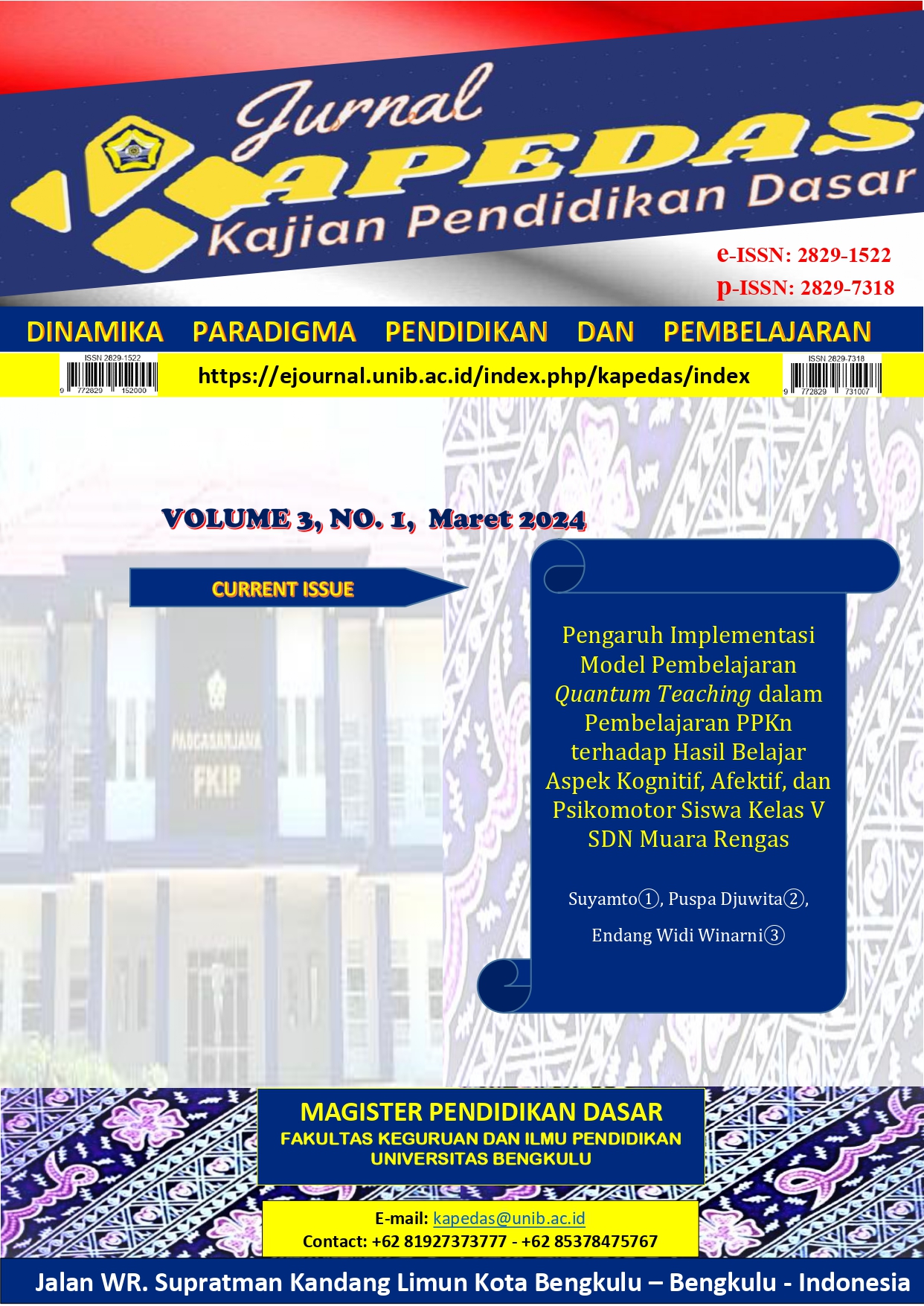Main Article Content
Abstract
This study aims to determine the feasibility of the material, language, design, student responses, and the effectiveness of products developed from environment-based worksheets to increase knowledge of the water cycle and its impacts for fifth graders of elementary school. This research is an ADDIE Research and Development (R&D) model. To measure the effectiveness of knowledge of the water cycle and its impact, tests were carried out twice, namely before and after learning took place in the control and experimental classes. The results of material validation, language, design and students' responses to environment-based worksheets are very appropriate and well used in learning so that students are happy and interested in learning science on the water cycle material and its impacts. The results of the effectiveness of the effectiveness of LKPD on knowledge of the water cycle and its impact on students. Judging from the results of the significance that is 0.008 is smaller than α = 0.05. Based on the gain score test from the use of LKPD, the results of the gain score were moderate, namely the control class was 47% and the experimental class was 59%. Thus, knowledge of the water cycle and its impacts using an environmentally based LKPD is declared effective.
Article Details
Copyright (c) 2024 Laila Sofiatun Janna, Endang Widi Winarni, Irwan Koto

This work is licensed under a Creative Commons Attribution-ShareAlike 4.0 International License.

Karya ini dilisensikan di bawah Creative Commons Attribution-ShareAlike 4.0 International License .
References
-
Fimala, Y., Alwi, N, A., Miaz, Y & Darmansyah. (2022). Blended Learning LKPD Development Based on Learning Using Nearpod Application for Integrates Learning in Elementary School. Journal of Innovation in Educational and Cultural Research. 3 (2). 97-105.
Isnaini., Damanik, I, H & Lubis, W. (2022). Development of LKPD Based on Local Wisdom to Improve the Learning Outcomes of Grade 6 Students at SDN 040460 Berastagi. AISTEEL. 20 (9).
Kosasi. (2021). Pengembangan Bahan Ajar. Jakarta: Bumi Aksara.
Kurniawan, H. (2020). Pembelajaran Era 4.0: Integrasi Penguatan Pendidikan Karakter, Keterampilan Abad 21, HOTS dan Literasi Dalam Perspektif Merdeka Belajar. Yogyakarta: Media Akademi.
Krisdiana, M., Goliah, M., Malihah, S., Nulhakim, L & Leksono. (2023). The Effect of Science LKPD Based Surrounding Environment on Learning Outcomes of Elementary School Students. Journal of Research in Science Education. 9 (5). 3916-3922.
Murni, A, W & Yasin, F, N. (2021). Pengembangan Lembar Kerja Peserta Didik (LKPD) Berbasis Proyek pada Materi Siklus Air Kelas V Sekolah Dasar. Jurnal Basicedu. 5 (6). 6196-6210.
Retnawati, H. (2016). Analisis Kuantitatif Instrumen Penelitian (Panduan Peneliti, Mahasiswa dan Psikometrian. Yogyakarta: Parama Publishing.
Sari, D, P., Caswita & Bharata, H. (2017). Pengembangan LKPD Berbasis Inkuiri Terbimbing Untuk Meningkatkan Kemampuan Berpikir Kritis Siswa. Jurnal Pendidikan Matematika Universitas Lampung. 5 (11).
Sa’adah, R, N, & Wahyu. (2020). Metode Penelitain R&D (Research and Development) Kajian Teoretis dan Aplikatif. Malang: Literasi Nusantara.
Widodo, S. (2017). Pengembangan Lembar Kegiatan Peserta Didik (LKPD) Berbasis Pendekatan Saintifik untuk Meningkatkan Keterampilan Penyelesaian Masalah Lingkungan Sekitar Peserta Didik di Sekolah Dasar. Jurnal Pendidikan Ilmu Sosial. 26 (2). 189-204.
Winarni, E, W. (2018). Pendekatan Ilmiah Dalam Pembelajaran Inovatif dan Kreatif. Bengkulu: Unit Penerbitan FKIP UNIB.
References
Isnaini., Damanik, I, H & Lubis, W. (2022). Development of LKPD Based on Local Wisdom to Improve the Learning Outcomes of Grade 6 Students at SDN 040460 Berastagi. AISTEEL. 20 (9).
Kosasi. (2021). Pengembangan Bahan Ajar. Jakarta: Bumi Aksara.
Kurniawan, H. (2020). Pembelajaran Era 4.0: Integrasi Penguatan Pendidikan Karakter, Keterampilan Abad 21, HOTS dan Literasi Dalam Perspektif Merdeka Belajar. Yogyakarta: Media Akademi.
Krisdiana, M., Goliah, M., Malihah, S., Nulhakim, L & Leksono. (2023). The Effect of Science LKPD Based Surrounding Environment on Learning Outcomes of Elementary School Students. Journal of Research in Science Education. 9 (5). 3916-3922.
Murni, A, W & Yasin, F, N. (2021). Pengembangan Lembar Kerja Peserta Didik (LKPD) Berbasis Proyek pada Materi Siklus Air Kelas V Sekolah Dasar. Jurnal Basicedu. 5 (6). 6196-6210.
Retnawati, H. (2016). Analisis Kuantitatif Instrumen Penelitian (Panduan Peneliti, Mahasiswa dan Psikometrian. Yogyakarta: Parama Publishing.
Sari, D, P., Caswita & Bharata, H. (2017). Pengembangan LKPD Berbasis Inkuiri Terbimbing Untuk Meningkatkan Kemampuan Berpikir Kritis Siswa. Jurnal Pendidikan Matematika Universitas Lampung. 5 (11).
Sa’adah, R, N, & Wahyu. (2020). Metode Penelitain R&D (Research and Development) Kajian Teoretis dan Aplikatif. Malang: Literasi Nusantara.
Widodo, S. (2017). Pengembangan Lembar Kegiatan Peserta Didik (LKPD) Berbasis Pendekatan Saintifik untuk Meningkatkan Keterampilan Penyelesaian Masalah Lingkungan Sekitar Peserta Didik di Sekolah Dasar. Jurnal Pendidikan Ilmu Sosial. 26 (2). 189-204.
Winarni, E, W. (2018). Pendekatan Ilmiah Dalam Pembelajaran Inovatif dan Kreatif. Bengkulu: Unit Penerbitan FKIP UNIB.
